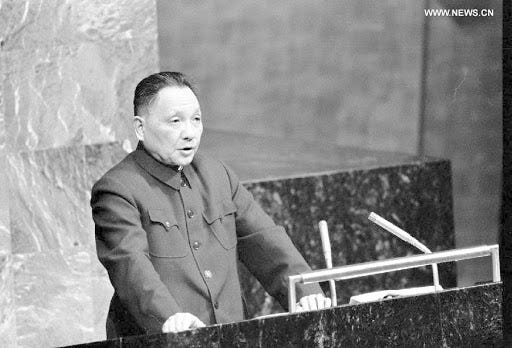
Followers of Chinese history know that 1978 was a great turning point in the nation’s economic history. On December 13th of that year, Deng Xiaoping—the then-premier of the Chinese Communist Party—delivered a carefully planned speech prefacing the momentous shift that was to occur in Chinese economic policy. Criticizing party members for clinging to the “book knowledge” of the past, Deng urged China to modernize in order to face the changing world order. What followed was one of the most ambitious economic transformations in modern history. China quickly moved from a centrally planned economy to a market economy, a policy of opening up and reform referred to as gaige kaifang (改革开放). China’s economy exploded, lifting hundreds of millions out of poverty and catapulting China onto the world stage.
Today, China is a strong (if not the primary) contender for global hegemony. The “rise of China,” as it has been dubbed, has been a topic of great attention for the past decade. Observers are right to pay attention: China’s explosive GDP growth, which sat at a staggering annual average of 14.2% before the 2008 recession, was leaps and bounds ahead of any other nation’s. Though this growth has leveled off somewhat today, China is still accelerating at an unprecedented rate, its GDP growing 18.3% in the first quarter of 2021.
As China has risen, anti-Chinese rhetoric has grown with it. This is hardly unexpected; any threat to American primacy evokes an aggressive response. Countless news outlets decry China as “backwards” and “undemocratic.” The CCP response to COVID-19 has been condemned as “beyond mere lying and negligence.” The FBI maintains a webpage dedicated to “the China threat,” and a quote from FBI Director Christopher Wray reinforcing China as the primary global threat headlines the page:
“The greatest long-term threat to our nation’s information and intellectual property, and to our economic vitality, is the counterintelligence and economic espionage threat from China.”
Increasingly, the U.S. stance against China has been one of confrontation rather than cooperation, verging on the outbreak of a “new Cold War.” The emergence, therefore, of the startling rise in Sinophobia and anti-Asian hate crimes is anything but unexpected.
In the 1970s and 80s, a Japan far removed from the imperialist dreams of World War II began to experience immense growth in its auto industry, becoming one of the world’s leading automotive manufacturers. This growth, which was facilitated by the U.S. as a bulwark against communism, immediately triggered an outpouring of anti-Japanese sentiment. American auto-workers, believing that the Japanese auto industry was stealing American jobs, began holding demonstrations around the country. One demonstration in Northern Indiana on Sept. 10, 1982 saw autoworkers smashing Japanese automobiles with sledgehammers. This anti-Japanese sentiment eventually led to the murder of Vincent Chin, an event that continues to shake the Asian American community to this day.
In many ways, the rise of China parallels Japan’s economic miracle. The response from America and the world has been even more severe: hatred for China, as the primary target for the West’s xenophobia in recent years and now, the scapegoat for COVID-19, has fueled a spree of hate crimes that makes the Chin case look like an isolated incident.
This is why demanding that we “raise awareness” and “recognize Asians as human” is simply a band-aid over a gaping wound. Though anti-Asian hate does not have purely economic origins, this struggle for primacy has fueled a perception of China as undemocratic and its people as backwards. Regardless of the veracity of these claims, it is not enough to believe that these issues are purely social. Rather, they are results of the dynamics endemic to capitalism, of the drive to dominate and compete, and of the need to dehumanize those that we attempt to triumph over. Until this curtain is lifted, things will never truly change for either Asian Americans or the next targets of American villain-making.
Perhaps Radio Free Amanda, someone who’s very quickly becoming one of my favorite figures, said it best:


Nations rise and fall. China’s explosive economic growth is part of a growing challenge to American hegemony, and its defense has been anti-Asian rhetoric and dehumanization. Regardless of the impact China’s rise will have on the international order, we must learn from the lessons of our past to prevent the worsening of our conditions today.
To further decolonize our minds:
The Short Guide to Capital in the 21st Century
Western Imperialism in East Asia
If you liked what you read, be sure to subscribe and follow us on Twitter and Instagram @invisibleasians to stay updated on Politically Invisible Asians!





"Rather, they are results of the dynamics endemic to capitalism, of the drive to dominate and compete, and of the need to dehumanize those that we attempt to triumph over"
YES! Nicely researched. The historical background is great too.